Updated: January 28, 2026
Written by Dan Simms
Nieves Martinez is a writer and editor at Fixr.com, specializing in home improvement and construction content. With over five years of experience and a Master's degree in Digital Marketing, she collaborates with industry professionals to create clear, carefully reviewed cost guides and renovation resources that help homeowners make informed remodeling decisions.
Learn moreReviewed by Nieves Martinez
On average, kitchen countertop installation costs $3,000. This price is based on a typical kitchen size of 35 square feet and reflects the cost of quartz, the most common countertop material. Most homeowners pay between $1,400 and $5,250, but prices can easily fall well outside of that range for budget or high-end materials.
Your kitchen is one of the key focal points in your home and a primary driver when it comes to home value, and your kitchen countertops can make or break the look and utility like no other component. Not only do your countertops make a statement about your personal style, but they also serve as the primary workspace in your home and need to stand up to constant wear and tear. Kitchen countertop cost is a key factor to understand if you’re planning on a kitchen remodel, and things like kitchen size, layout, and countertop material can all affect your costs.
Kitchen Countertop Replacement Cost

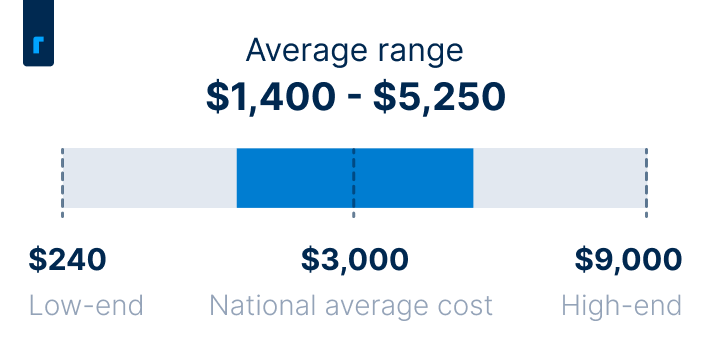
Kitchen Countertop Installation Cost Factors
The costs of kitchen countertop replacement vary widely based on several key factors, including the material you choose, your kitchen’s size and layout, edge profile, installation complexity, and local labor rates. Considering these variables together will help you estimate your total project cost more accurately.
Average Cost of Kitchen Countertops by Material
The material you choose will have the biggest impact on your material costs, with something like budget-friendly laminate costing as little as $15 per square foot and high-end quartzite reaching $200 per square foot.
Beyond cost, durability matters. Countertops face daily wear from heat, moisture, spills, and impact. Some materials resist staining, scratching, and heat better than others, which affects both long-term appearance and overall value.
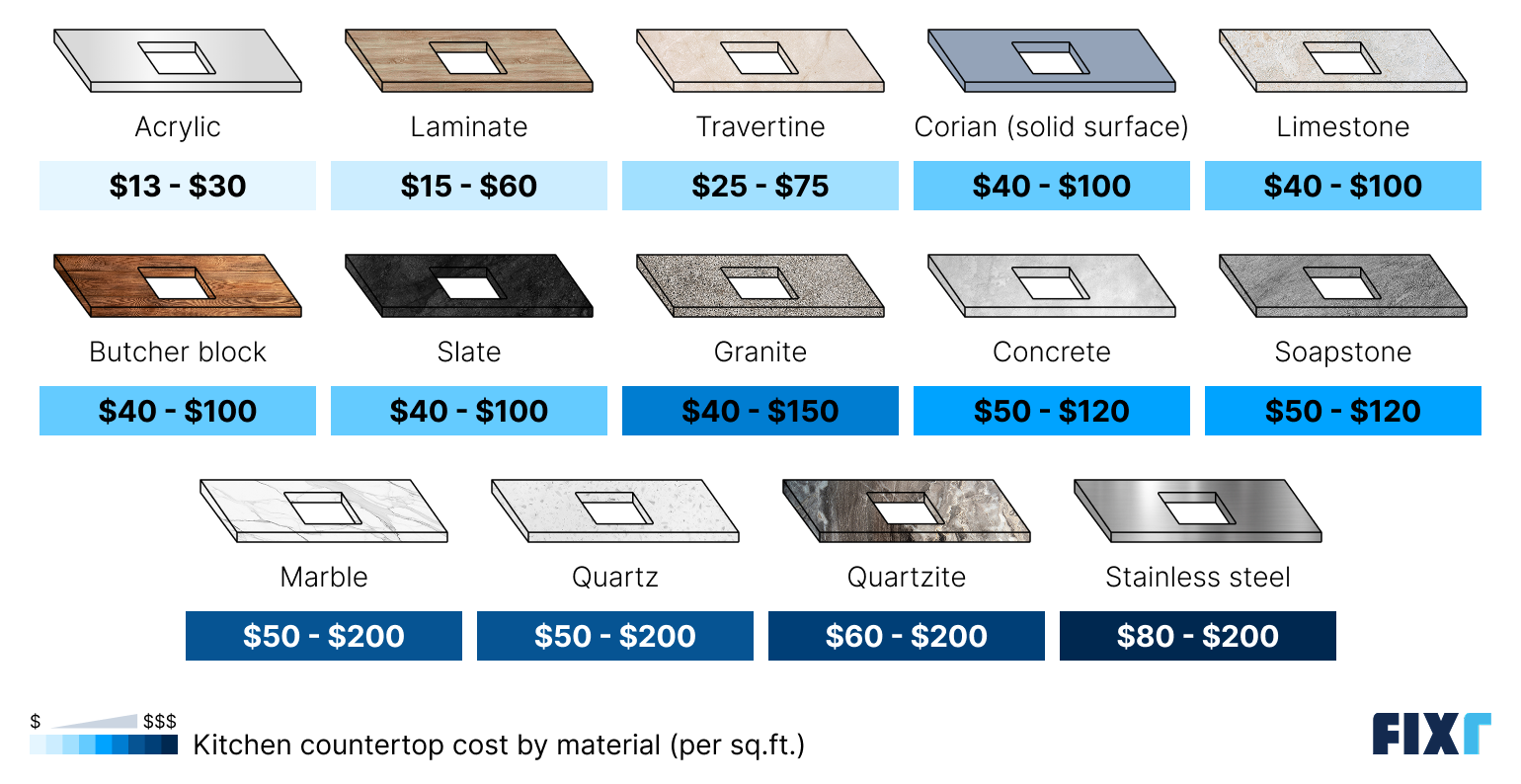
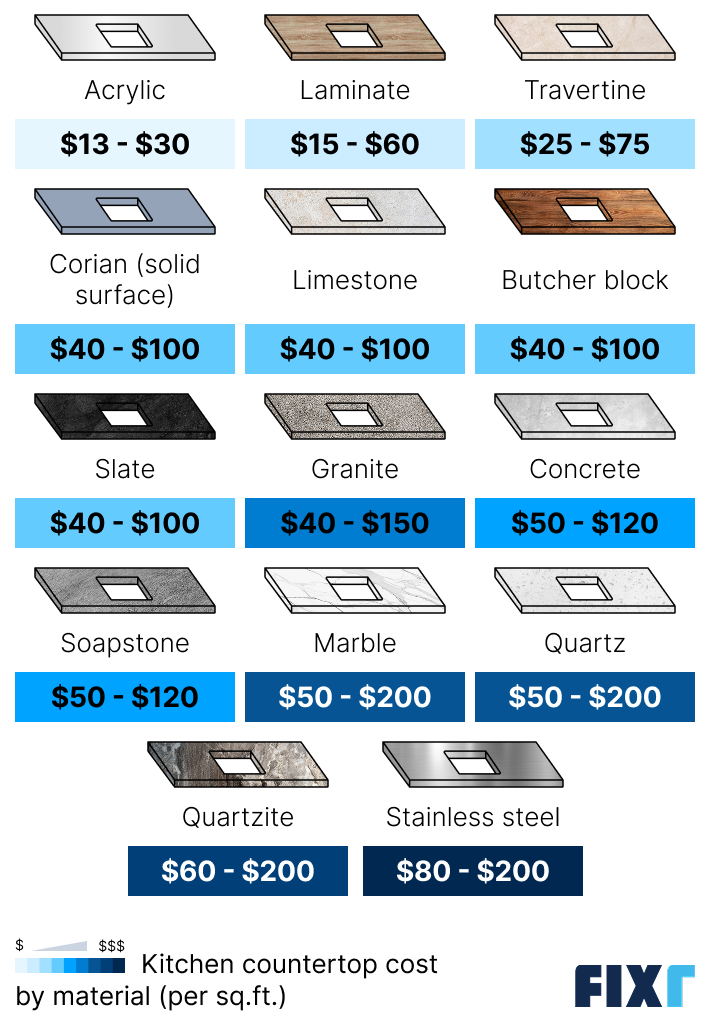
Material | Cost per Sq.Ft. |
Acrylic | $13 – $30 |
$15 – $60 | |
Travertine | $25 – $75 |
Corian (solid surface) | $40 – $100 |
Limestone | $40 – $100 |
$40 – $100 | |
Slate | $40 – $100 |
$40 – $150 | |
$50 – $120 | |
$50 – $120 | |
$50 – $200 | |
$50 – $200+ | |
$60 – $200 | |
$80 – $200 |
Your countertop material usually determines the installation method. Natural stone is installed as slabs, engineered materials often use modular or pre-cast sections, concrete may be cast in place, and tile is built on site. Since installation complexity affects labor costs, choosing simpler methods (like slab or modular) can help keep your total project price down.
Cost to Replace Kitchen Countertops by Size & Complexity
In addition to the material you choose, your total cost depends on how much countertop you need and how complex your layout is. Most kitchens have 30 or 40 square feet of countertop. At an average of $40 to $150 per square foot, that puts a typical replacement between $1,200 and $6,000.
Kitchen layout plays a big role. Galley kitchens usually need less countertop than U-shaped layouts, and adding an island increases square footage. Design complexity matters too. Custom shapes, curved edges, or extra cutouts for sinks or dispensers can significantly raise installation costs.
For a rough estimate, measure the linear feet of countertop and multiply by the depth to calculate total square footage. Then use the table below to compare price ranges across different materials.
Countertop Size | Average Costs (Installed) |
10 sq.ft. | $400 - $1,500 |
20 sq.ft. | $800 - $3,000 |
30 sq.ft. | $1,200 - $4,500 |
40 sq.ft. | $1,600 - $6,000 |
Edge & Corner Treatments
Your edge profile affects the final price, with more decorative options increasing the cost per linear foot.
Eased edge (standard): Usually included at no extra cost. Features a slight roundover on top for a clean, simple finish.
Beveled, half bullnose, and full bullnose: Typically add $10 to $15 per linear foot. Beveled edges have a flat angled face, half bullnose rounds the top edge, and full bullnose is rounded on both top and bottom.
Mitered edges: Create a modern, thicker look and generally add $20 to $25 per linear foot.
Ogee and Dupont: More decorative profiles that usually add $20 to $25 (ogee) and $20 to $40 (Dupont) per linear foot. These are most common on high-end materials like marble.
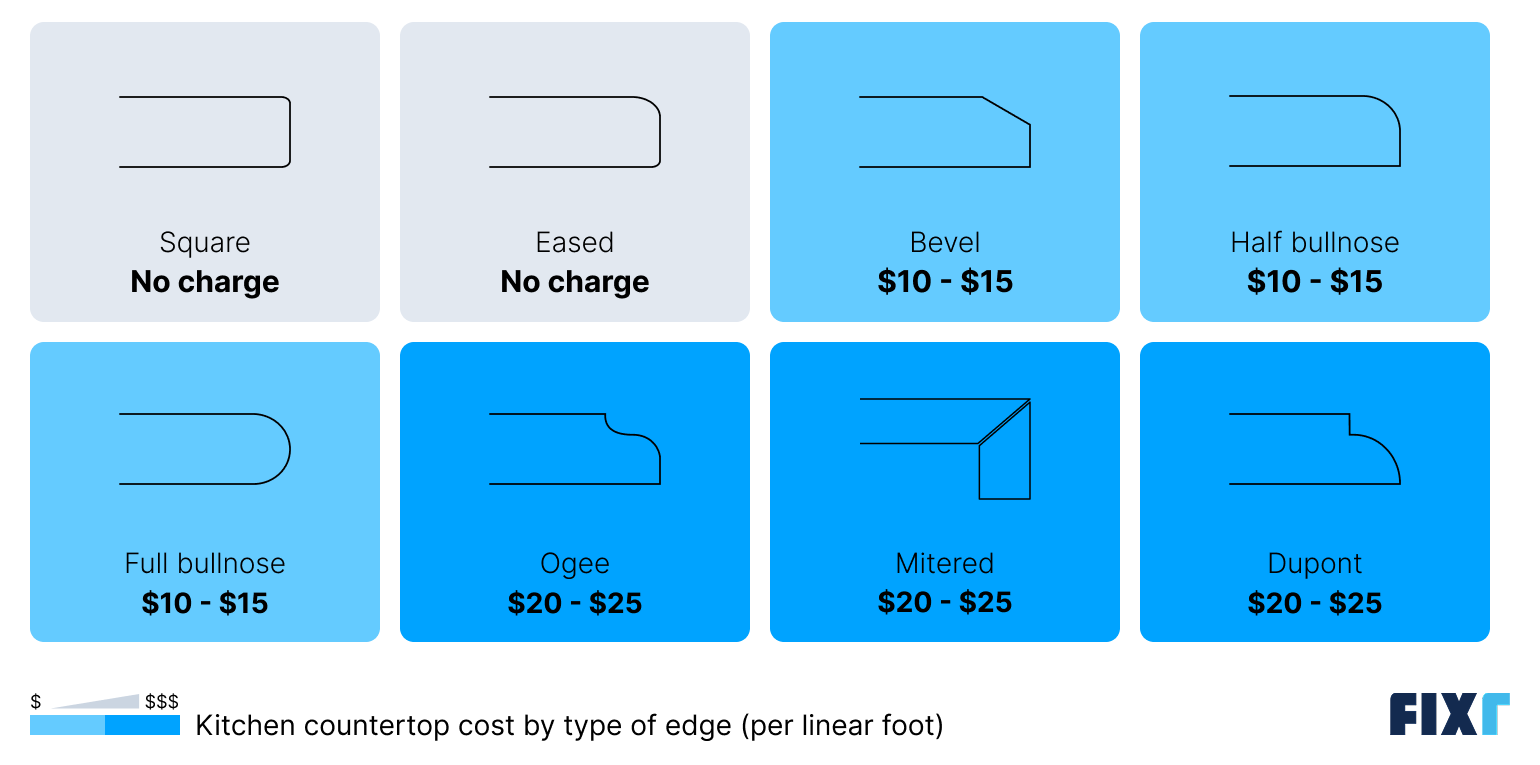
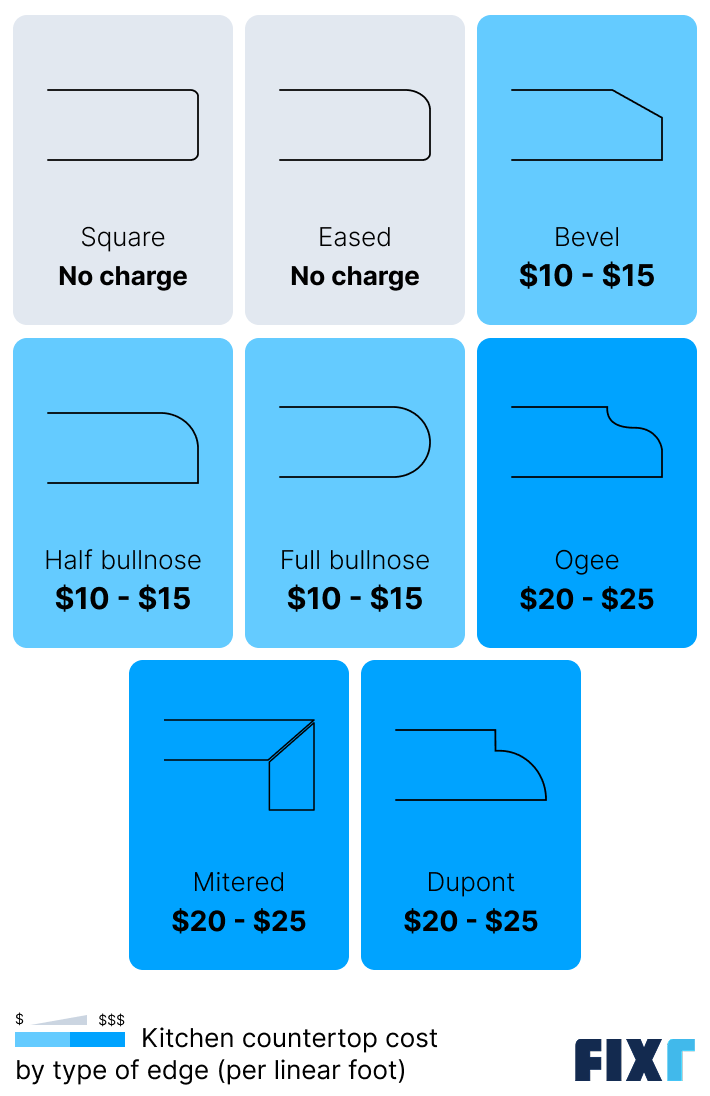
Edging Type | Average Costs per Linear Foot (Installed) |
Eased | No charge |
Squared | No charge |
Bevel | $10 - $15 |
Half bullnose | $10 - $15 |
Full bullnose | $10 - $15 |
Ogee | $20 - $25 |
Mitered | $20 - $25 |
Dupont | $20 - $40 |
Not all edge profiles are compatible with every material or thickness. Materials like laminate, concrete, and tile have fewer options. Thinner countertops might not support complex profiles like Ogee or Dupont.
Labor Cost to Install Kitchen Countertops
While material prices get most of the attention, labor typically makes up 15% to 30% of your total project cost. For an average kitchen, installation alone usually runs between $450 and $900. This often includes delivery and installation, though removal of old countertops may be billed separately depending on the contractor.
Labor costs vary by location and material. Lightweight options like laminate are quicker to install and keep labor costs lower. More complex materials, such as concrete or tile, require custom work and longer installation times, which can significantly increase labor as a share of your total cost.
Additional Costs and Considerations
There are some additional factors that can affect the average cost of new kitchen countertops. While these usually have a smaller impact, they can still influence your final estimate.
Location and access: Costs are higher in major metro areas and increase if your kitchen is on an upper floor or has limited access.
Prep work and upgrades: Removing old countertops may add $50 to $300. Heavier materials like granite may require cabinet reinforcement, which can cost a few hundred dollars.
Cutouts: Extra openings for sinks, dispensers, or cooktops typically cost $100 to $200 each.
Plumbing and electrical: Sink reconnection usually runs $45 to $200 per hour. Electrical work may be needed if outlets are moved or upgraded.
Garbage disposal: Adding a garbage disposal unit costs $150 to $650 on average, with premium models reaching $1,000.
Backsplash installation: Adding a new backsplash alongside your countertops can refresh your kitchen and protect your walls from moisture and spills. Expect to pay $500 to $1,500, depending on size, material, and installation complexity. Doing both projects at the same time can sometimes help reduce overall labor costs.
Lighting and smart features: Integrated lighting and smart kitchen upgrades, like undermount lights, smart faucets, or connected appliances, can improve both functionality and ambiance. These kitchen and countertop trends can add hundreds to your total, but can make your kitchen more user-friendly and inviting.
New kitchen countertops can freshen up your space, but repairing or resurfacing your existing countertops could be a much more affordable option. If your stone, solid surface, or quartz countertops are chipped, faded, or are suffering from burn marks, ask a professional about resurfacing to see if it’s an option for your circumstances. If you’re dreaming of an entirely new space, then replacing your countertops is the way to go.
How to Save Money on Your Countertop Project
Replacing your kitchen countertops can quickly get expensive, especially if it’s a part of a bigger kitchen remodel that involves new cabinets, flooring, and appliances. There are a few things you can do to help keep your countertop costs down.
Choose your material carefully: Prices range from about $13 to $200 per square foot. Budget-friendly options like laminate, acrylic, or travertine can help reduce upfront costs.
Balance price with durability: Cheaper materials may need replacement sooner. Investing in more durable kitchen countertops, like granite, can cost more upfront but often provides better long-term value.
Consider color and pattern: With natural stone, rare colors and bold veining usually cost more than neutral or uniform slabs.
Keep edge profiles simple: An eased edge is typically the most affordable. Decorative profiles like Dupont or Ogee can add hundreds to your total.
Get multiple quotes: Compare at least three estimates to find the best value and understand what’s included.
DIY vs. Hiring a Professional
With labor averaging between $370 and $740, some homeowners consider DIY installation to save money. While this can reduce upfront costs, it’s best to hire a professional.
Kitchen countertops are heavy and difficult to maneuver, especially in homes with stairs or tight corners, which increases the risk of injury or material damage. Even with help from friends or family, it’s easy to make measurement or fitting mistakes, and choosing the wrong materials can lead to structural issues with your cabinets. If you DIY, you’re responsible for any errors, and fixing them can end up costing more than the money you initially saved.
FAQs
Kitchen countertop replacement costs an average of $3,000, with most homeowners paying between $1,400 and $5,250 for standard materials. Budget options like laminate can cost as little as $240, while premium choices such as quartzite or custom stainless steel can reach $9,000. Your final price depends on kitchen size, layout, material, and installation complexity.
It’s smart to budget at least $4,000 for new kitchen countertops, or up to $10,000 for high-end materials like marble or stainless steel. While the average project runs around $3,000, setting aside extra funds for cutouts, edge upgrades, and cabinet reinforcement can help avoid surprises.
Removing and replacing kitchen countertops costs about $3,000 on average. Countertop removal typically runs $50 to $300, depending on material, and may or may not be included in your contractor’s quote. Total project costs usually range from $240 for laminate to $8,000 to $9,000 for quartzite or custom stainless steel.
Countertops are priced by square footage, not kitchen size, so costs depend on layout. A typical 10x10 galley or L-shaped kitchen has about 40 square feet of countertop. At $40 to $150 per square foot, replacement usually ranges from $1,600 to $6,000, with islands or extra counters increasing the total.
Quartz is one of the most popular options and offers strong value for many homeowners. At an average of $88 per square foot, it costs more upfront than laminate but provides excellent durability, low maintenance, stain resistance, and long-term performance. For many kitchens, it strikes a good balance between price and longevity.
